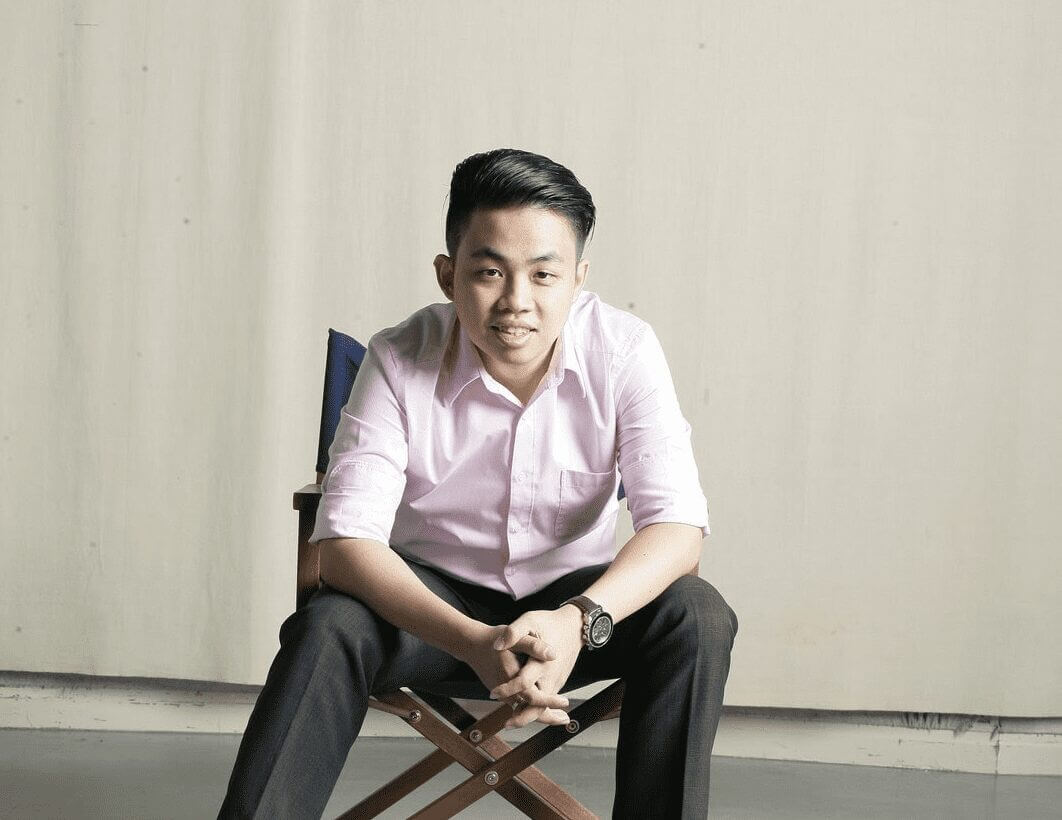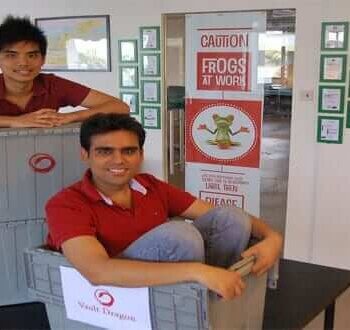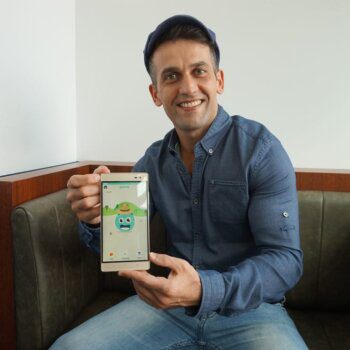Like most Malaysians, Gwi Terk Chern started his professional life in the corporate world. For 3 years, he toiled as a management associate for Astro before quickly climbing into a senior executive in the strategic finance department. Despite, establishing himself comfortably in the corporate world, Terk Chern felt a greater calling at hand. Being a major foodie in addition to his exposure to multiculturalism, Terk Chern decided to start Dinez-in in an attempt to make a valuable impact in Malaysia through entrepreneurship. The Asian Entrepreneur has the opportunity to speak to Terk Chern today about his startup.
In your own words what is Dinez-in?
Dinez-in is a platform which helps home chefs share their food with the world, and lead hungry tummies to good old-fashioned home cooking. The Dinez-in difference lies in one word: empowerment. We offer a fully-functioning platform that gives chefs the best support system, providing them with the skills they need to cultivate a sustainable business model. You can sell your home-made foods online, cater for certain events, welcome guests to dine with you, and even teach cooking classes in the comfort of home.
Every kitchen is a story: From the retiree realizing a lifetime dream of running his own food business, to someone who lost her legs in an accident and never gave up, the single mother of one who juggles childcare with making ends meet, to the baking whiz who’s still a student and can’t afford to set up a café just yet–we’re here for all of them. We’re here to give them what they need to make their dreams of self-sustenance and culinary artistry a reality.
How did Dinez-in come about?
Firstly, our founder – TC loves to cook and eat, mostly eating. On top of that, he is raised in a Peranakan (Baba Nyonya) family with many culinary experts around him. Of all, his grandmother and mother are great cooks and they truly embrace all kind of culture. He had to learn how to fold a ketupak, bake chinese new year cookies, make satay, capati and others since young. He then realised there are so many great recipes just within his family, and believe there will be even more outside.
Aside from that, he is also inspired by the thoughts of homesick. Busy with works, earning money, socializing, chasing dreams; going home, seems to be a luxury. Missing home cooked food is one common phenomenon in this busy city, which then inspires us to create this home cooked online platform. Home is always everyone’s haven.
Lastly and most importantly, as above mentioned, we hope to bring more love to the society. One of TC’s initial objectives of starting Dinez-in is to help those who are in need. We have single mothers, retirees, disables and many more who are underprivileged in our platform; we are dedicated to assist these group of people. By the end of the day, it also helps to increase the productivity of our society and providing more opportunities to them.
Could you walk us through the process of starting up Dinez-in?
There were many interesting ideas spark my interest back then. However, none of them were solid enough to convince myself that “This Is It”. Only at around middle 2015, I came out with the idea of Dinez-in, and then took around 6 months to conduct some research. In addition, it took me quite a while to convince my wife and my parents with regards to the idea of me resigning from the previous job. Fortunately, they were very supportive.
Did you encounter any particular difficulties initially and if so, how did you overcome it?
It wasn’t easy to gather the like-minded talents together and work towards the same vision.
In the beginning, there were a lot of experiments to test such as our marketing direction, user interface and user experience, operation flow and others.
At the early stage, the operation works required heavy manpower and caused the extra heavy workload. Therefore, we decided to digitalize some business process and the automation process has significantly lightened our workload.
How have you been developing Dinez-in since the beginning?
In the beginning of January 2016, it took me another 6 months to gather the right team. William, Head of Tech, and Vee Gee, Head of Operations joined the team of Dinez-in even before we start operating. We are invested for RM200K by an angel investor at May 2016 as pre-seed investment. We had our first team meeting on July, and took another 3 months on the planning of business operations, technology, marketing and strategy. At October 2016, we started operating officially with our MVP. On February 2017, we re-launch again after collected numerous feedback on operation, technology and marketing efficiency.
At the initial stages we only provide the service of dine in, nevertheless we realized the needs of other services from a number of home chefs. Eventually, we have all 4 main products (meals, goodies, catering, and classes) and, both delivery and dine in service available.
What is the process behind developing your products?
Yes, we are in the midst of designing and developing our first version. We are planning to launch the first Android’s and iOS’s version of Dinez-in mobile app on July 2017. Stay tuned!
Interestingly speaking, our app developers are also deep foodie lovers too! They have been following us everywhere to taste different home chefs’ dishes and goodies.
Do you face a lot of competition in this industry?
Yes, there’re a number of direct and indirect competitors entering the market recently. Nevertheless, we always keep our agility ahead of our competitors. Moreover, we have
Have you developed any industry insights that you could share?
As spoken, home-cooking is in a growing trend at recent years. Aside from that, dine in and delivery service is also only on a rising trend. What we foresee is that not only café and restaurant, but those talents outside these premises will be more familiar with the
What is the future of the industry and how do you plan to stay relevant in this industry?
Home cooked foods have its unique market attractiveness. In a few years, home cooked foods will have its own market due to its product differentiation and price leadership. Aside from that, we emphasis a lot of customer experience, we always try to bring the best experience for both our chefs and users.
Were there anything that disappointed you initially?
I won’t see it as disappointment; it’s more of a motivation to bring us forward. In the beginning, I went through a tough time gathering the right team. Most startups failed because we are short of talents.
What is your opinion on Asian entrepreneurship vs Western entrepreneurship?
Many Asian economic practices are today still very much a reflection of family values deeply rooted in Asian society, with honor being one of the abiding objectives of such practices. There’s a study supported the theory that the possibility to gain face through social status identified with entrepreneurship and lose face through business failure were more prominent in Asia. Culture level shame of failure related negatively to feasibility and desire towards entrepreneurship in Asia. Singaporean and Indonesian interviewer stated that they would only start a business if it was a pledge. To innovate, they would prefer to do it within the protective walls of a larger company.
In most of the Western countries, a common view is that people start businesses in order to innovate. In fact, it is noticed that a negative relationship exists in Western culture that suggests the connection between innovation and entrepreneurship might dampen the desire to start a business. Icons of entrepreneurship like Bill Gates and Steve Jobs, who emphasis the importance of innovation, may discourage people who lack an innovative idea to venture their own business.
What is your definition of success?
Success does not define with the state of wealth; it’s more of a state of mind. Success does not have easily defined boundaries. It’s as varied as those who attempt to define it.
In your opinion, what are the keys to entrepreneurial success?
Being an entrepreneur will never be easy no matter in Asia or other places. Many believe that entrepreneurial success happens overnight so the entrepreneurs able to have a shorter working hour, more free time and high income level too. In reality, entrepreneurship means building your business carefully and faithfully a day in day out marathon of work with very little glamour over a period of years. Being an entrepreneur means hardcore perseverance and working extended hours than what a normal employee usually does. In fact, work really never ends when you become an entrepreneur.
When I become an entrepreneur, I don’t expect customers to go crazy about my products or services straightaway. They might even reject it outright for seemingly no reason at all. Being able to handle that elegantly and continuing to try again until you get what your customers want right will be the key to success.
Any parting words of wisdom for entrepreneurs out there from your personal experience?
To the fellow dreamers, it is good to be humble. However, at certain matters, it is impossible for you to keep low profile. If you don’t do some crazy stuff when you’re young, if not, you have nothing to be called memory.
It is an ugly world, when you are in a devastating situation; don’t turn your back to someone who you don’t trust, because there might be a knife stabbed through your chest.
What’s more terrifying is not the fear of failure or power of your strength, but our thoughts staying in the comfort zone. There’s a fine line between modest and norms, being different give someone more motive to persuade others.
Connect
LinkedIn: https://www.linkedin.com/in/gwi-terk-chern-b8135539/
Facebook: https://www.facebook.com/tcgwi
Website: https://wiseintro.co/tcgwi






























